Bachelor Thesis: Terrorism's Impact on Tourism in Egypt
VerifiedAdded on 2023/03/17
|27
|11526
|100
Thesis and Dissertation
AI Summary
This Bachelor's thesis from Geneva Business School, submitted by Mariam Mounib, investigates the significant impact of terrorism on Egypt's tourism industry. The research examines the historical context, including the Luxor massacre and subsequent attacks, and analyzes the decline in tourism revenue. The study includes a thorough literature review, exploring the connection between terrorism and tourism, the psychology of tourists, and the economic consequences of terrorism. The thesis employs an interpretivist research philosophy with a descriptive research design, utilizing qualitative data analysis through interviews with industry professionals, such as Samih Sawiris, and thematic analysis. The findings reveal a clear correlation between terrorist attacks and the downturn in tourism, leading to recommendations for future strategies. The thesis is structured into five chapters, covering the introduction, literature review, methodology, findings, and conclusions, offering insights into the challenges faced by the Egyptian tourism sector and potential solutions to mitigate the impact of terrorism and revive the industry. The research also considers the steps taken by the Egyptian government to address the issue.
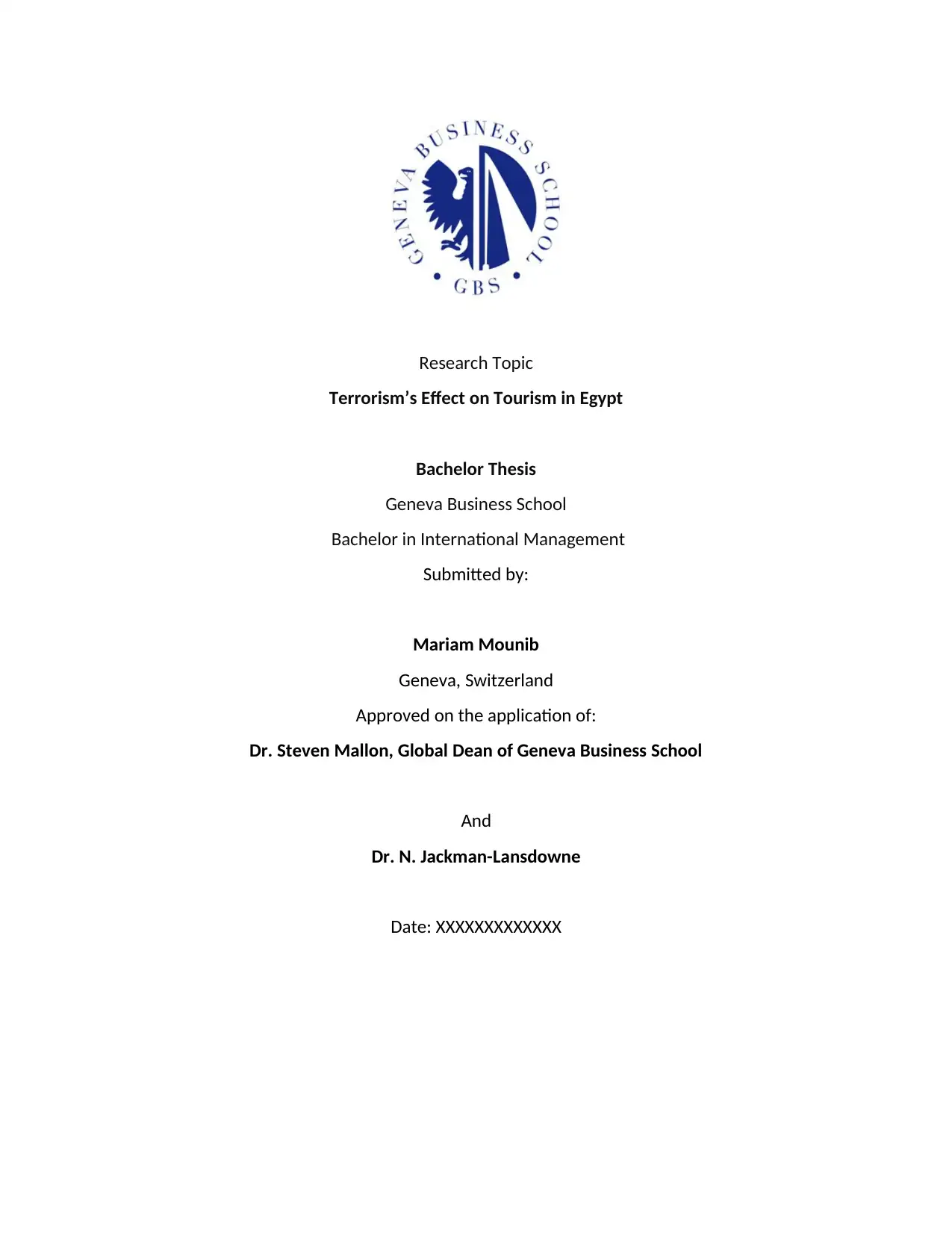
Research Topic
Terrorism’s Effect on Tourism in Egypt
Bachelor Thesis
Geneva Business School
Bachelor in International Management
Submitted by:
Mariam Mounib
Geneva, Switzerland
Approved on the application of:
Dr. Steven Mallon, Global Dean of Geneva Business School
And
Dr. N. Jackman-Lansdowne
Date: XXXXXXXXXXXXX
Terrorism’s Effect on Tourism in Egypt
Bachelor Thesis
Geneva Business School
Bachelor in International Management
Submitted by:
Mariam Mounib
Geneva, Switzerland
Approved on the application of:
Dr. Steven Mallon, Global Dean of Geneva Business School
And
Dr. N. Jackman-Lansdowne
Date: XXXXXXXXXXXXX
Paraphrase This Document
Need a fresh take? Get an instant paraphrase of this document with our AI Paraphraser
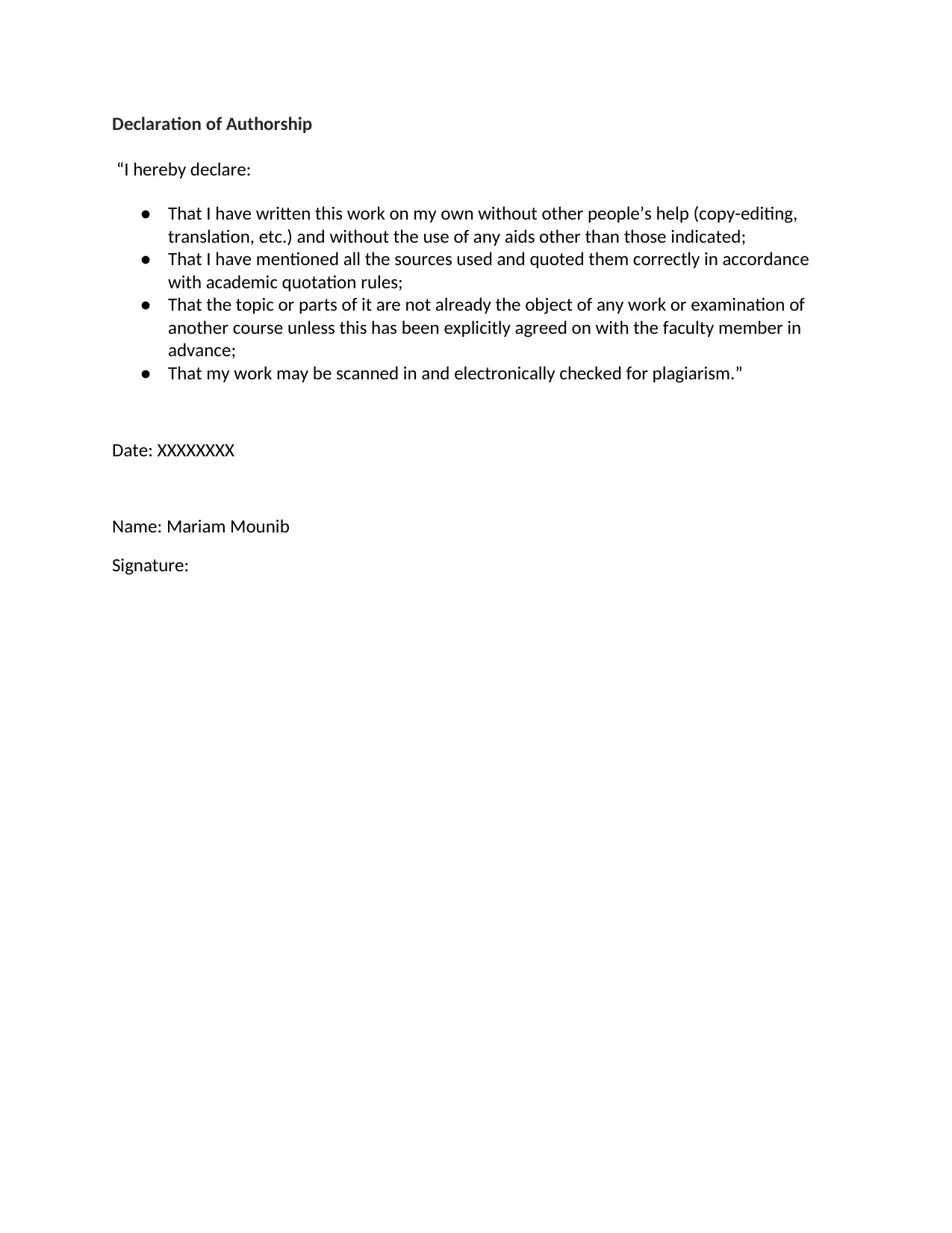
Declaration of Authorship
“I hereby declare:
● That I have written this work on my own without other people’s help (copy-editing,
translation, etc.) and without the use of any aids other than those indicated;
● That I have mentioned all the sources used and quoted them correctly in accordance
with academic quotation rules;
● That the topic or parts of it are not already the object of any work or examination of
another course unless this has been explicitly agreed on with the faculty member in
advance;
● That my work may be scanned in and electronically checked for plagiarism.”
Date: XXXXXXXX
Name: Mariam Mounib
Signature:
“I hereby declare:
● That I have written this work on my own without other people’s help (copy-editing,
translation, etc.) and without the use of any aids other than those indicated;
● That I have mentioned all the sources used and quoted them correctly in accordance
with academic quotation rules;
● That the topic or parts of it are not already the object of any work or examination of
another course unless this has been explicitly agreed on with the faculty member in
advance;
● That my work may be scanned in and electronically checked for plagiarism.”
Date: XXXXXXXX
Name: Mariam Mounib
Signature:

Acknowledgements
"First of all I thank my teachers and advisors for the help they offered me throughout my
research period and throughout my tenure at Geneva Business School. Their constant help in
editing and advising allowed me to complete this very important work in my life. I would also
like to thank Mr. Samih Sawiris for so generously allotting me time from his very busy schedule
and allowing me to interview him and giving me insight into tourism in Egypt from a firsthand
perspective. Finally, I would like to thank my parents for the unceasing support they have
always given me and for the opportunities provided to me by them."
"First of all I thank my teachers and advisors for the help they offered me throughout my
research period and throughout my tenure at Geneva Business School. Their constant help in
editing and advising allowed me to complete this very important work in my life. I would also
like to thank Mr. Samih Sawiris for so generously allotting me time from his very busy schedule
and allowing me to interview him and giving me insight into tourism in Egypt from a firsthand
perspective. Finally, I would like to thank my parents for the unceasing support they have
always given me and for the opportunities provided to me by them."
⊘ This is a preview!⊘
Do you want full access?
Subscribe today to unlock all pages.

Trusted by 1+ million students worldwide
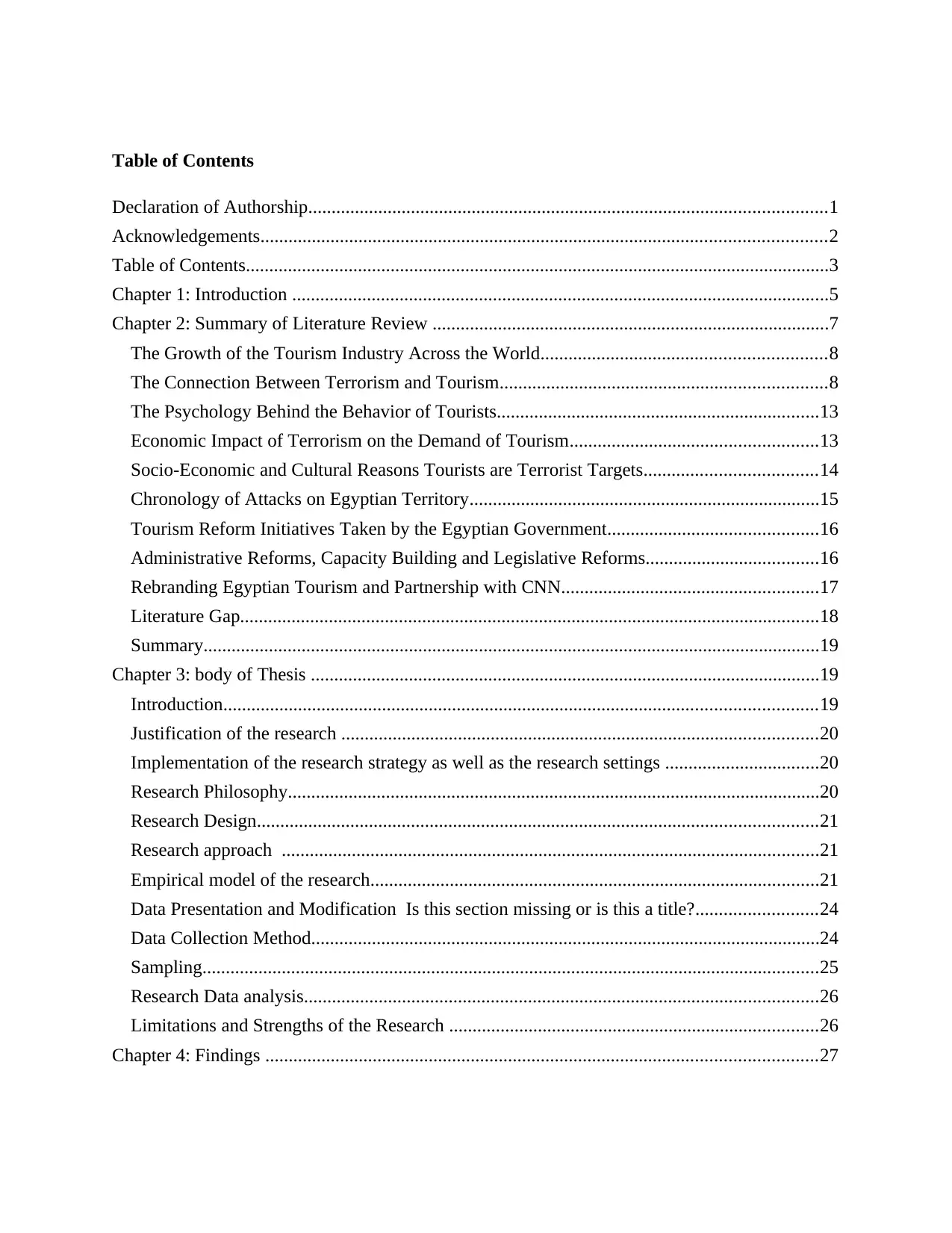
Table of Contents
Declaration of Authorship...............................................................................................................1
Acknowledgements.........................................................................................................................2
Table of Contents.............................................................................................................................3
Chapter 1: Introduction ...................................................................................................................5
Chapter 2: Summary of Literature Review .....................................................................................7
The Growth of the Tourism Industry Across the World.............................................................8
The Connection Between Terrorism and Tourism......................................................................8
The Psychology Behind the Behavior of Tourists.....................................................................13
Economic Impact of Terrorism on the Demand of Tourism.....................................................13
Socio-Economic and Cultural Reasons Tourists are Terrorist Targets.....................................14
Chronology of Attacks on Egyptian Territory...........................................................................15
Tourism Reform Initiatives Taken by the Egyptian Government.............................................16
Administrative Reforms, Capacity Building and Legislative Reforms.....................................16
Rebranding Egyptian Tourism and Partnership with CNN.......................................................17
Literature Gap............................................................................................................................18
Summary....................................................................................................................................19
Chapter 3: body of Thesis .............................................................................................................19
Introduction...............................................................................................................................19
Justification of the research ......................................................................................................20
Implementation of the research strategy as well as the research settings .................................20
Research Philosophy..................................................................................................................20
Research Design........................................................................................................................21
Research approach ...................................................................................................................21
Empirical model of the research................................................................................................21
Data Presentation and Modification Is this section missing or is this a title?..........................24
Data Collection Method.............................................................................................................24
Sampling....................................................................................................................................25
Research Data analysis..............................................................................................................26
Limitations and Strengths of the Research ...............................................................................26
Chapter 4: Findings ......................................................................................................................27
Declaration of Authorship...............................................................................................................1
Acknowledgements.........................................................................................................................2
Table of Contents.............................................................................................................................3
Chapter 1: Introduction ...................................................................................................................5
Chapter 2: Summary of Literature Review .....................................................................................7
The Growth of the Tourism Industry Across the World.............................................................8
The Connection Between Terrorism and Tourism......................................................................8
The Psychology Behind the Behavior of Tourists.....................................................................13
Economic Impact of Terrorism on the Demand of Tourism.....................................................13
Socio-Economic and Cultural Reasons Tourists are Terrorist Targets.....................................14
Chronology of Attacks on Egyptian Territory...........................................................................15
Tourism Reform Initiatives Taken by the Egyptian Government.............................................16
Administrative Reforms, Capacity Building and Legislative Reforms.....................................16
Rebranding Egyptian Tourism and Partnership with CNN.......................................................17
Literature Gap............................................................................................................................18
Summary....................................................................................................................................19
Chapter 3: body of Thesis .............................................................................................................19
Introduction...............................................................................................................................19
Justification of the research ......................................................................................................20
Implementation of the research strategy as well as the research settings .................................20
Research Philosophy..................................................................................................................20
Research Design........................................................................................................................21
Research approach ...................................................................................................................21
Empirical model of the research................................................................................................21
Data Presentation and Modification Is this section missing or is this a title?..........................24
Data Collection Method.............................................................................................................24
Sampling....................................................................................................................................25
Research Data analysis..............................................................................................................26
Limitations and Strengths of the Research ...............................................................................26
Chapter 4: Findings ......................................................................................................................27
Paraphrase This Document
Need a fresh take? Get an instant paraphrase of this document with our AI Paraphraser
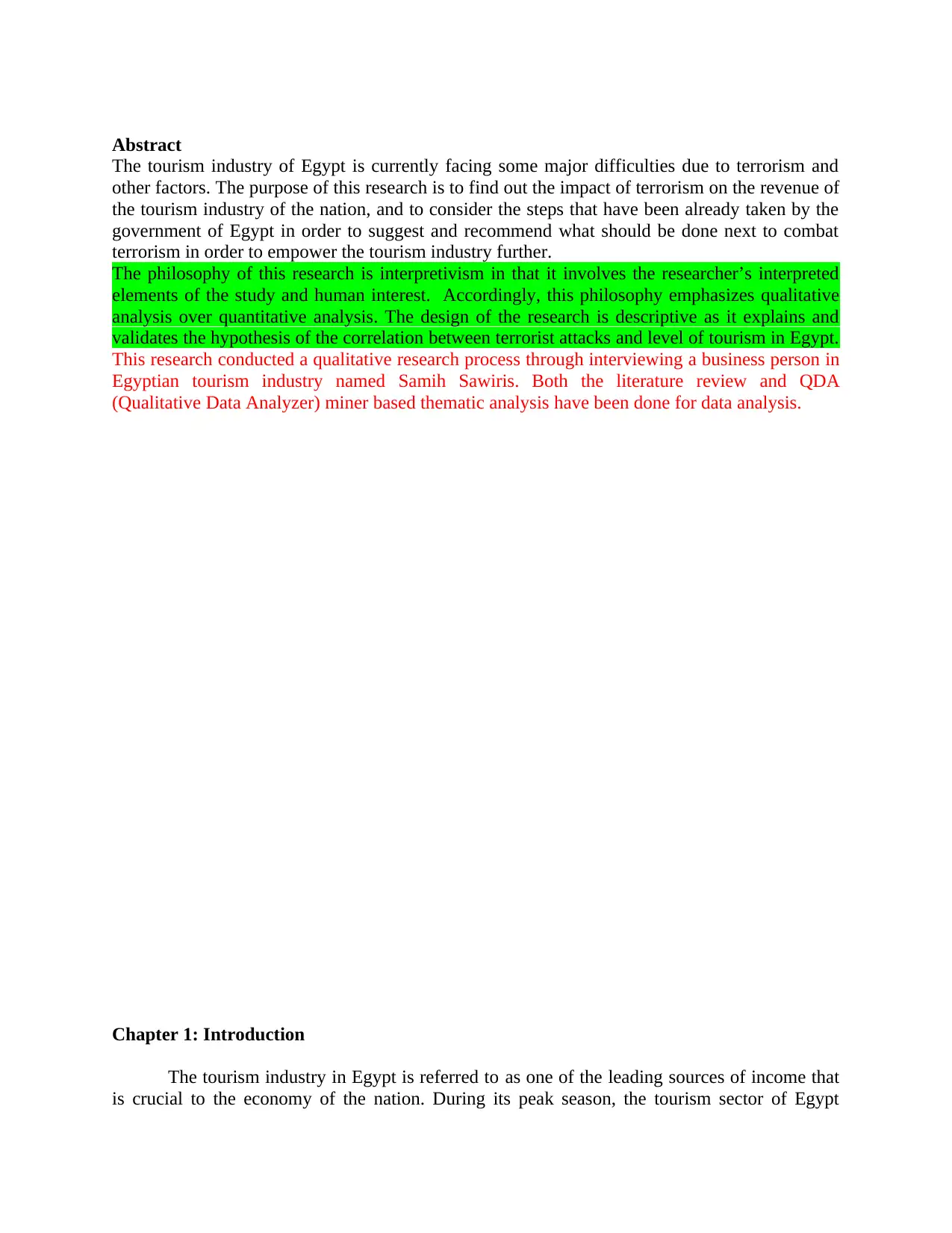
Abstract
The tourism industry of Egypt is currently facing some major difficulties due to terrorism and
other factors. The purpose of this research is to find out the impact of terrorism on the revenue of
the tourism industry of the nation, and to consider the steps that have been already taken by the
government of Egypt in order to suggest and recommend what should be done next to combat
terrorism in order to empower the tourism industry further.
The philosophy of this research is interpretivism in that it involves the researcher’s interpreted
elements of the study and human interest. Accordingly, this philosophy emphasizes qualitative
analysis over quantitative analysis. The design of the research is descriptive as it explains and
validates the hypothesis of the correlation between terrorist attacks and level of tourism in Egypt.
This research conducted a qualitative research process through interviewing a business person in
Egyptian tourism industry named Samih Sawiris. Both the literature review and QDA
(Qualitative Data Analyzer) miner based thematic analysis have been done for data analysis.
Chapter 1: Introduction
The tourism industry in Egypt is referred to as one of the leading sources of income that
is crucial to the economy of the nation. During its peak season, the tourism sector of Egypt
The tourism industry of Egypt is currently facing some major difficulties due to terrorism and
other factors. The purpose of this research is to find out the impact of terrorism on the revenue of
the tourism industry of the nation, and to consider the steps that have been already taken by the
government of Egypt in order to suggest and recommend what should be done next to combat
terrorism in order to empower the tourism industry further.
The philosophy of this research is interpretivism in that it involves the researcher’s interpreted
elements of the study and human interest. Accordingly, this philosophy emphasizes qualitative
analysis over quantitative analysis. The design of the research is descriptive as it explains and
validates the hypothesis of the correlation between terrorist attacks and level of tourism in Egypt.
This research conducted a qualitative research process through interviewing a business person in
Egyptian tourism industry named Samih Sawiris. Both the literature review and QDA
(Qualitative Data Analyzer) miner based thematic analysis have been done for data analysis.
Chapter 1: Introduction
The tourism industry in Egypt is referred to as one of the leading sources of income that
is crucial to the economy of the nation. During its peak season, the tourism sector of Egypt
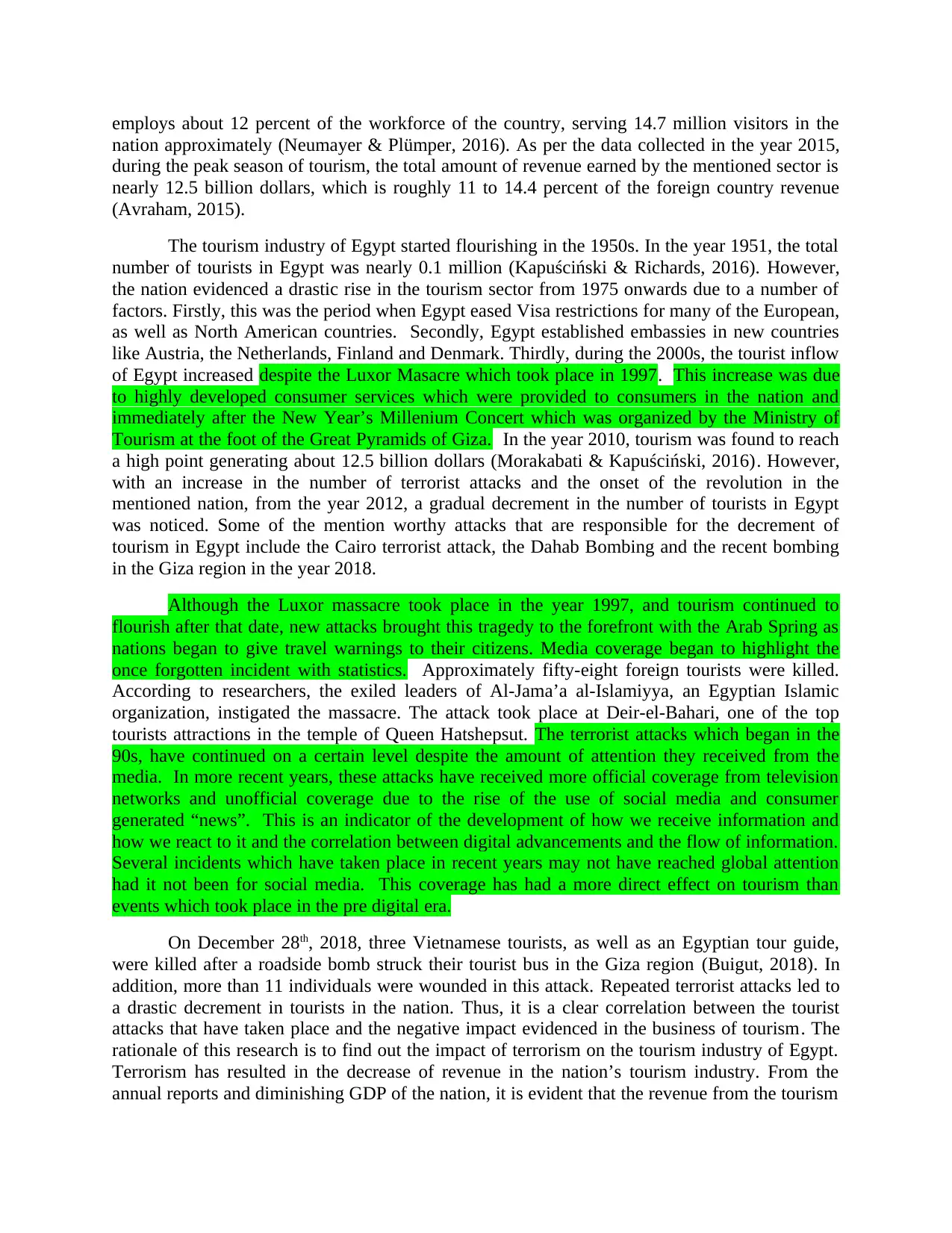
employs about 12 percent of the workforce of the country, serving 14.7 million visitors in the
nation approximately (Neumayer & Plümper, 2016). As per the data collected in the year 2015,
during the peak season of tourism, the total amount of revenue earned by the mentioned sector is
nearly 12.5 billion dollars, which is roughly 11 to 14.4 percent of the foreign country revenue
(Avraham, 2015).
The tourism industry of Egypt started flourishing in the 1950s. In the year 1951, the total
number of tourists in Egypt was nearly 0.1 million (Kapuściński & Richards, 2016). However,
the nation evidenced a drastic rise in the tourism sector from 1975 onwards due to a number of
factors. Firstly, this was the period when Egypt eased Visa restrictions for many of the European,
as well as North American countries. Secondly, Egypt established embassies in new countries
like Austria, the Netherlands, Finland and Denmark. Thirdly, during the 2000s, the tourist inflow
of Egypt increased despite the Luxor Masacre which took place in 1997. This increase was due
to highly developed consumer services which were provided to consumers in the nation and
immediately after the New Year’s Millenium Concert which was organized by the Ministry of
Tourism at the foot of the Great Pyramids of Giza. In the year 2010, tourism was found to reach
a high point generating about 12.5 billion dollars (Morakabati & Kapuściński, 2016). However,
with an increase in the number of terrorist attacks and the onset of the revolution in the
mentioned nation, from the year 2012, a gradual decrement in the number of tourists in Egypt
was noticed. Some of the mention worthy attacks that are responsible for the decrement of
tourism in Egypt include the Cairo terrorist attack, the Dahab Bombing and the recent bombing
in the Giza region in the year 2018.
Although the Luxor massacre took place in the year 1997, and tourism continued to
flourish after that date, new attacks brought this tragedy to the forefront with the Arab Spring as
nations began to give travel warnings to their citizens. Media coverage began to highlight the
once forgotten incident with statistics. Approximately fifty-eight foreign tourists were killed.
According to researchers, the exiled leaders of Al-Jama’a al-Islamiyya, an Egyptian Islamic
organization, instigated the massacre. The attack took place at Deir-el-Bahari, one of the top
tourists attractions in the temple of Queen Hatshepsut. The terrorist attacks which began in the
90s, have continued on a certain level despite the amount of attention they received from the
media. In more recent years, these attacks have received more official coverage from television
networks and unofficial coverage due to the rise of the use of social media and consumer
generated “news”. This is an indicator of the development of how we receive information and
how we react to it and the correlation between digital advancements and the flow of information.
Several incidents which have taken place in recent years may not have reached global attention
had it not been for social media. This coverage has had a more direct effect on tourism than
events which took place in the pre digital era.
On December 28th, 2018, three Vietnamese tourists, as well as an Egyptian tour guide,
were killed after a roadside bomb struck their tourist bus in the Giza region (Buigut, 2018). In
addition, more than 11 individuals were wounded in this attack. Repeated terrorist attacks led to
a drastic decrement in tourists in the nation. Thus, it is a clear correlation between the tourist
attacks that have taken place and the negative impact evidenced in the business of tourism. The
rationale of this research is to find out the impact of terrorism on the tourism industry of Egypt.
Terrorism has resulted in the decrease of revenue in the nation’s tourism industry. From the
annual reports and diminishing GDP of the nation, it is evident that the revenue from the tourism
nation approximately (Neumayer & Plümper, 2016). As per the data collected in the year 2015,
during the peak season of tourism, the total amount of revenue earned by the mentioned sector is
nearly 12.5 billion dollars, which is roughly 11 to 14.4 percent of the foreign country revenue
(Avraham, 2015).
The tourism industry of Egypt started flourishing in the 1950s. In the year 1951, the total
number of tourists in Egypt was nearly 0.1 million (Kapuściński & Richards, 2016). However,
the nation evidenced a drastic rise in the tourism sector from 1975 onwards due to a number of
factors. Firstly, this was the period when Egypt eased Visa restrictions for many of the European,
as well as North American countries. Secondly, Egypt established embassies in new countries
like Austria, the Netherlands, Finland and Denmark. Thirdly, during the 2000s, the tourist inflow
of Egypt increased despite the Luxor Masacre which took place in 1997. This increase was due
to highly developed consumer services which were provided to consumers in the nation and
immediately after the New Year’s Millenium Concert which was organized by the Ministry of
Tourism at the foot of the Great Pyramids of Giza. In the year 2010, tourism was found to reach
a high point generating about 12.5 billion dollars (Morakabati & Kapuściński, 2016). However,
with an increase in the number of terrorist attacks and the onset of the revolution in the
mentioned nation, from the year 2012, a gradual decrement in the number of tourists in Egypt
was noticed. Some of the mention worthy attacks that are responsible for the decrement of
tourism in Egypt include the Cairo terrorist attack, the Dahab Bombing and the recent bombing
in the Giza region in the year 2018.
Although the Luxor massacre took place in the year 1997, and tourism continued to
flourish after that date, new attacks brought this tragedy to the forefront with the Arab Spring as
nations began to give travel warnings to their citizens. Media coverage began to highlight the
once forgotten incident with statistics. Approximately fifty-eight foreign tourists were killed.
According to researchers, the exiled leaders of Al-Jama’a al-Islamiyya, an Egyptian Islamic
organization, instigated the massacre. The attack took place at Deir-el-Bahari, one of the top
tourists attractions in the temple of Queen Hatshepsut. The terrorist attacks which began in the
90s, have continued on a certain level despite the amount of attention they received from the
media. In more recent years, these attacks have received more official coverage from television
networks and unofficial coverage due to the rise of the use of social media and consumer
generated “news”. This is an indicator of the development of how we receive information and
how we react to it and the correlation between digital advancements and the flow of information.
Several incidents which have taken place in recent years may not have reached global attention
had it not been for social media. This coverage has had a more direct effect on tourism than
events which took place in the pre digital era.
On December 28th, 2018, three Vietnamese tourists, as well as an Egyptian tour guide,
were killed after a roadside bomb struck their tourist bus in the Giza region (Buigut, 2018). In
addition, more than 11 individuals were wounded in this attack. Repeated terrorist attacks led to
a drastic decrement in tourists in the nation. Thus, it is a clear correlation between the tourist
attacks that have taken place and the negative impact evidenced in the business of tourism. The
rationale of this research is to find out the impact of terrorism on the tourism industry of Egypt.
Terrorism has resulted in the decrease of revenue in the nation’s tourism industry. From the
annual reports and diminishing GDP of the nation, it is evident that the revenue from the tourism
⊘ This is a preview!⊘
Do you want full access?
Subscribe today to unlock all pages.

Trusted by 1+ million students worldwide
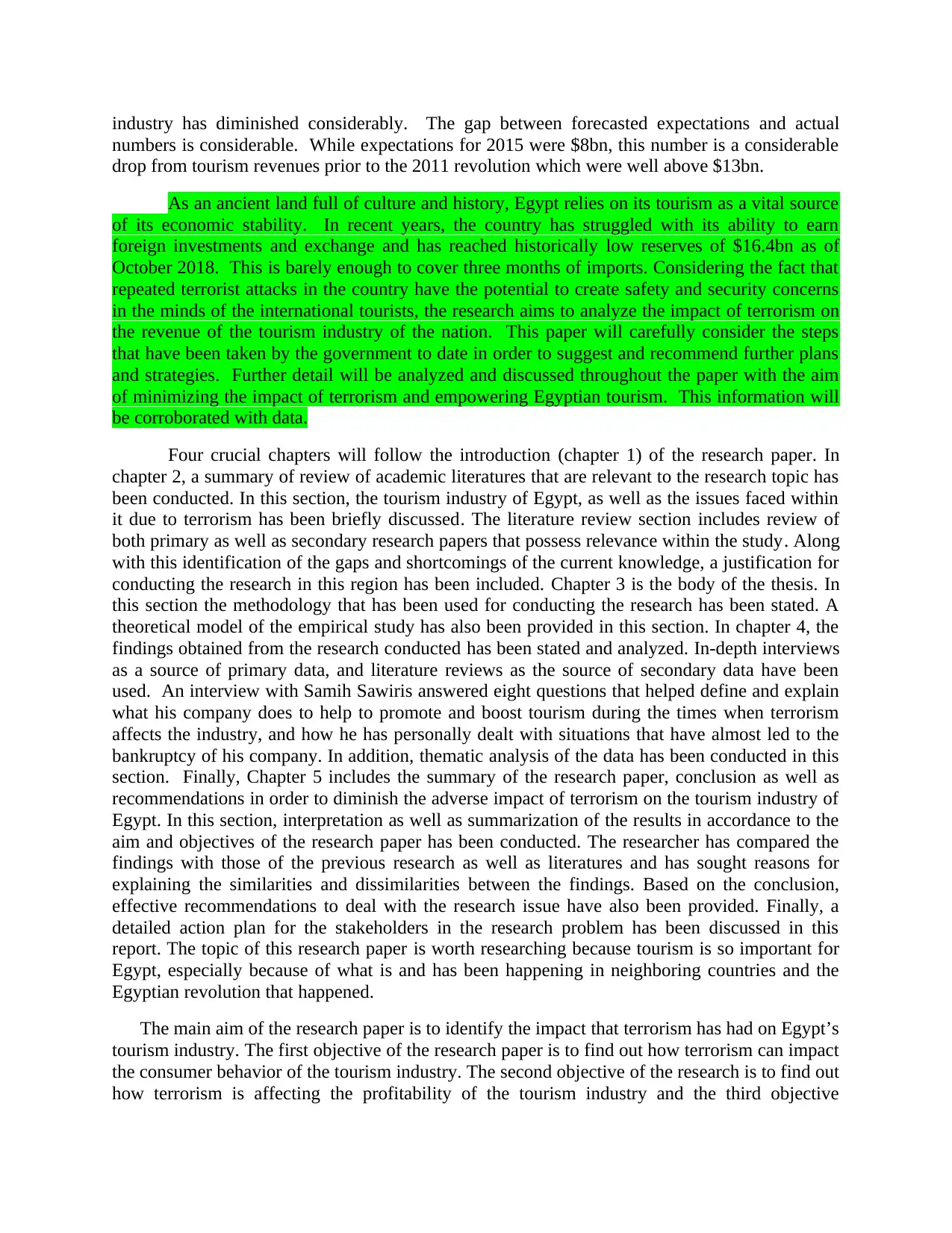
industry has diminished considerably. The gap between forecasted expectations and actual
numbers is considerable. While expectations for 2015 were $8bn, this number is a considerable
drop from tourism revenues prior to the 2011 revolution which were well above $13bn.
As an ancient land full of culture and history, Egypt relies on its tourism as a vital source
of its economic stability. In recent years, the country has struggled with its ability to earn
foreign investments and exchange and has reached historically low reserves of $16.4bn as of
October 2018. This is barely enough to cover three months of imports. Considering the fact that
repeated terrorist attacks in the country have the potential to create safety and security concerns
in the minds of the international tourists, the research aims to analyze the impact of terrorism on
the revenue of the tourism industry of the nation. This paper will carefully consider the steps
that have been taken by the government to date in order to suggest and recommend further plans
and strategies. Further detail will be analyzed and discussed throughout the paper with the aim
of minimizing the impact of terrorism and empowering Egyptian tourism. This information will
be corroborated with data.
Four crucial chapters will follow the introduction (chapter 1) of the research paper. In
chapter 2, a summary of review of academic literatures that are relevant to the research topic has
been conducted. In this section, the tourism industry of Egypt, as well as the issues faced within
it due to terrorism has been briefly discussed. The literature review section includes review of
both primary as well as secondary research papers that possess relevance within the study. Along
with this identification of the gaps and shortcomings of the current knowledge, a justification for
conducting the research in this region has been included. Chapter 3 is the body of the thesis. In
this section the methodology that has been used for conducting the research has been stated. A
theoretical model of the empirical study has also been provided in this section. In chapter 4, the
findings obtained from the research conducted has been stated and analyzed. In-depth interviews
as a source of primary data, and literature reviews as the source of secondary data have been
used. An interview with Samih Sawiris answered eight questions that helped define and explain
what his company does to help to promote and boost tourism during the times when terrorism
affects the industry, and how he has personally dealt with situations that have almost led to the
bankruptcy of his company. In addition, thematic analysis of the data has been conducted in this
section. Finally, Chapter 5 includes the summary of the research paper, conclusion as well as
recommendations in order to diminish the adverse impact of terrorism on the tourism industry of
Egypt. In this section, interpretation as well as summarization of the results in accordance to the
aim and objectives of the research paper has been conducted. The researcher has compared the
findings with those of the previous research as well as literatures and has sought reasons for
explaining the similarities and dissimilarities between the findings. Based on the conclusion,
effective recommendations to deal with the research issue have also been provided. Finally, a
detailed action plan for the stakeholders in the research problem has been discussed in this
report. The topic of this research paper is worth researching because tourism is so important for
Egypt, especially because of what is and has been happening in neighboring countries and the
Egyptian revolution that happened.
The main aim of the research paper is to identify the impact that terrorism has had on Egypt’s
tourism industry. The first objective of the research paper is to find out how terrorism can impact
the consumer behavior of the tourism industry. The second objective of the research is to find out
how terrorism is affecting the profitability of the tourism industry and the third objective
numbers is considerable. While expectations for 2015 were $8bn, this number is a considerable
drop from tourism revenues prior to the 2011 revolution which were well above $13bn.
As an ancient land full of culture and history, Egypt relies on its tourism as a vital source
of its economic stability. In recent years, the country has struggled with its ability to earn
foreign investments and exchange and has reached historically low reserves of $16.4bn as of
October 2018. This is barely enough to cover three months of imports. Considering the fact that
repeated terrorist attacks in the country have the potential to create safety and security concerns
in the minds of the international tourists, the research aims to analyze the impact of terrorism on
the revenue of the tourism industry of the nation. This paper will carefully consider the steps
that have been taken by the government to date in order to suggest and recommend further plans
and strategies. Further detail will be analyzed and discussed throughout the paper with the aim
of minimizing the impact of terrorism and empowering Egyptian tourism. This information will
be corroborated with data.
Four crucial chapters will follow the introduction (chapter 1) of the research paper. In
chapter 2, a summary of review of academic literatures that are relevant to the research topic has
been conducted. In this section, the tourism industry of Egypt, as well as the issues faced within
it due to terrorism has been briefly discussed. The literature review section includes review of
both primary as well as secondary research papers that possess relevance within the study. Along
with this identification of the gaps and shortcomings of the current knowledge, a justification for
conducting the research in this region has been included. Chapter 3 is the body of the thesis. In
this section the methodology that has been used for conducting the research has been stated. A
theoretical model of the empirical study has also been provided in this section. In chapter 4, the
findings obtained from the research conducted has been stated and analyzed. In-depth interviews
as a source of primary data, and literature reviews as the source of secondary data have been
used. An interview with Samih Sawiris answered eight questions that helped define and explain
what his company does to help to promote and boost tourism during the times when terrorism
affects the industry, and how he has personally dealt with situations that have almost led to the
bankruptcy of his company. In addition, thematic analysis of the data has been conducted in this
section. Finally, Chapter 5 includes the summary of the research paper, conclusion as well as
recommendations in order to diminish the adverse impact of terrorism on the tourism industry of
Egypt. In this section, interpretation as well as summarization of the results in accordance to the
aim and objectives of the research paper has been conducted. The researcher has compared the
findings with those of the previous research as well as literatures and has sought reasons for
explaining the similarities and dissimilarities between the findings. Based on the conclusion,
effective recommendations to deal with the research issue have also been provided. Finally, a
detailed action plan for the stakeholders in the research problem has been discussed in this
report. The topic of this research paper is worth researching because tourism is so important for
Egypt, especially because of what is and has been happening in neighboring countries and the
Egyptian revolution that happened.
The main aim of the research paper is to identify the impact that terrorism has had on Egypt’s
tourism industry. The first objective of the research paper is to find out how terrorism can impact
the consumer behavior of the tourism industry. The second objective of the research is to find out
how terrorism is affecting the profitability of the tourism industry and the third objective
Paraphrase This Document
Need a fresh take? Get an instant paraphrase of this document with our AI Paraphraser
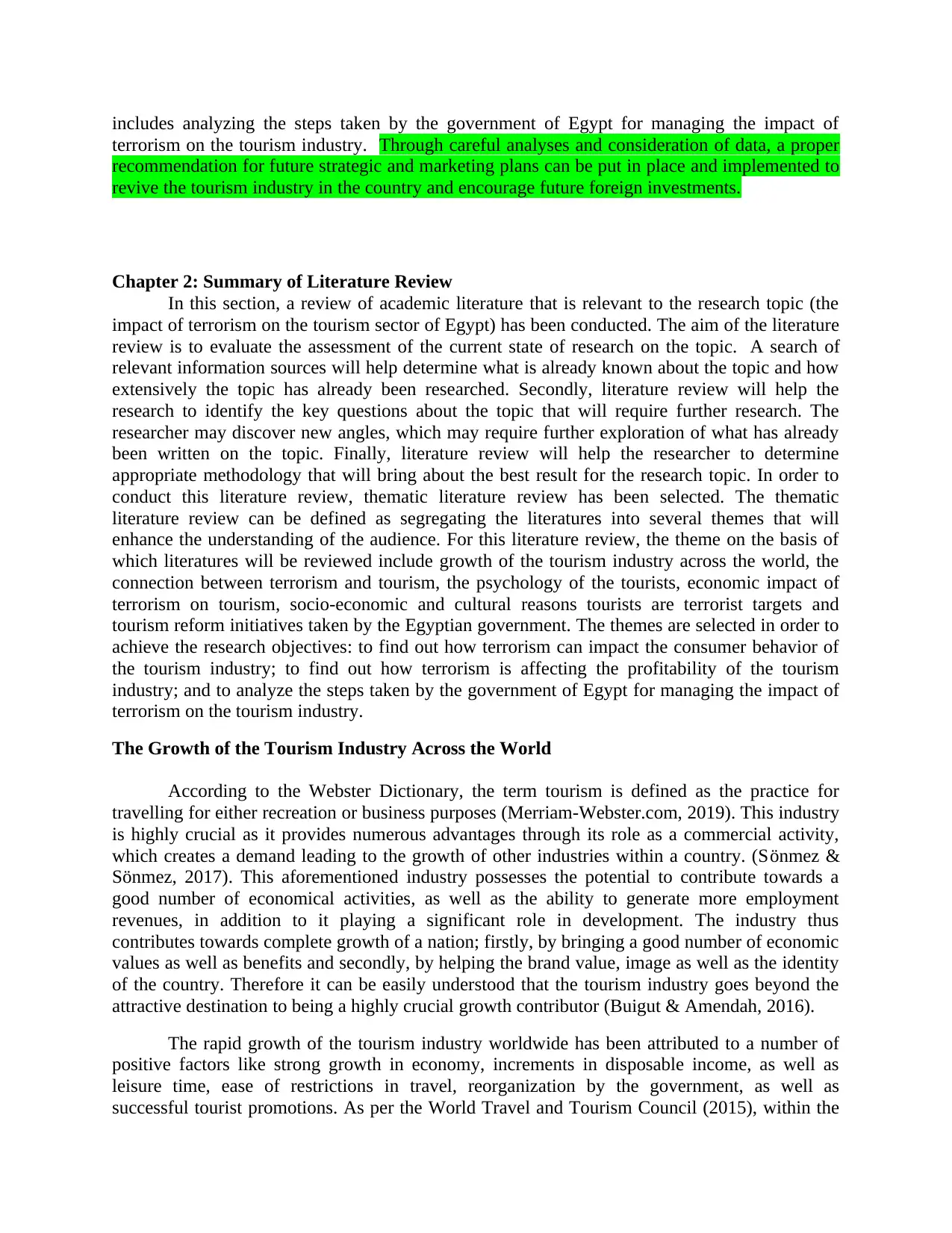
includes analyzing the steps taken by the government of Egypt for managing the impact of
terrorism on the tourism industry. Through careful analyses and consideration of data, a proper
recommendation for future strategic and marketing plans can be put in place and implemented to
revive the tourism industry in the country and encourage future foreign investments.
Chapter 2: Summary of Literature Review
In this section, a review of academic literature that is relevant to the research topic (the
impact of terrorism on the tourism sector of Egypt) has been conducted. The aim of the literature
review is to evaluate the assessment of the current state of research on the topic. A search of
relevant information sources will help determine what is already known about the topic and how
extensively the topic has already been researched. Secondly, literature review will help the
research to identify the key questions about the topic that will require further research. The
researcher may discover new angles, which may require further exploration of what has already
been written on the topic. Finally, literature review will help the researcher to determine
appropriate methodology that will bring about the best result for the research topic. In order to
conduct this literature review, thematic literature review has been selected. The thematic
literature review can be defined as segregating the literatures into several themes that will
enhance the understanding of the audience. For this literature review, the theme on the basis of
which literatures will be reviewed include growth of the tourism industry across the world, the
connection between terrorism and tourism, the psychology of the tourists, economic impact of
terrorism on tourism, socio-economic and cultural reasons tourists are terrorist targets and
tourism reform initiatives taken by the Egyptian government. The themes are selected in order to
achieve the research objectives: to find out how terrorism can impact the consumer behavior of
the tourism industry; to find out how terrorism is affecting the profitability of the tourism
industry; and to analyze the steps taken by the government of Egypt for managing the impact of
terrorism on the tourism industry.
The Growth of the Tourism Industry Across the World
According to the Webster Dictionary, the term tourism is defined as the practice for
travelling for either recreation or business purposes (Merriam-Webster.com, 2019). This industry
is highly crucial as it provides numerous advantages through its role as a commercial activity,
which creates a demand leading to the growth of other industries within a country. (Sönmez &
Sönmez, 2017). This aforementioned industry possesses the potential to contribute towards a
good number of economical activities, as well as the ability to generate more employment
revenues, in addition to it playing a significant role in development. The industry thus
contributes towards complete growth of a nation; firstly, by bringing a good number of economic
values as well as benefits and secondly, by helping the brand value, image as well as the identity
of the country. Therefore it can be easily understood that the tourism industry goes beyond the
attractive destination to being a highly crucial growth contributor (Buigut & Amendah, 2016).
The rapid growth of the tourism industry worldwide has been attributed to a number of
positive factors like strong growth in economy, increments in disposable income, as well as
leisure time, ease of restrictions in travel, reorganization by the government, as well as
successful tourist promotions. As per the World Travel and Tourism Council (2015), within the
terrorism on the tourism industry. Through careful analyses and consideration of data, a proper
recommendation for future strategic and marketing plans can be put in place and implemented to
revive the tourism industry in the country and encourage future foreign investments.
Chapter 2: Summary of Literature Review
In this section, a review of academic literature that is relevant to the research topic (the
impact of terrorism on the tourism sector of Egypt) has been conducted. The aim of the literature
review is to evaluate the assessment of the current state of research on the topic. A search of
relevant information sources will help determine what is already known about the topic and how
extensively the topic has already been researched. Secondly, literature review will help the
research to identify the key questions about the topic that will require further research. The
researcher may discover new angles, which may require further exploration of what has already
been written on the topic. Finally, literature review will help the researcher to determine
appropriate methodology that will bring about the best result for the research topic. In order to
conduct this literature review, thematic literature review has been selected. The thematic
literature review can be defined as segregating the literatures into several themes that will
enhance the understanding of the audience. For this literature review, the theme on the basis of
which literatures will be reviewed include growth of the tourism industry across the world, the
connection between terrorism and tourism, the psychology of the tourists, economic impact of
terrorism on tourism, socio-economic and cultural reasons tourists are terrorist targets and
tourism reform initiatives taken by the Egyptian government. The themes are selected in order to
achieve the research objectives: to find out how terrorism can impact the consumer behavior of
the tourism industry; to find out how terrorism is affecting the profitability of the tourism
industry; and to analyze the steps taken by the government of Egypt for managing the impact of
terrorism on the tourism industry.
The Growth of the Tourism Industry Across the World
According to the Webster Dictionary, the term tourism is defined as the practice for
travelling for either recreation or business purposes (Merriam-Webster.com, 2019). This industry
is highly crucial as it provides numerous advantages through its role as a commercial activity,
which creates a demand leading to the growth of other industries within a country. (Sönmez &
Sönmez, 2017). This aforementioned industry possesses the potential to contribute towards a
good number of economical activities, as well as the ability to generate more employment
revenues, in addition to it playing a significant role in development. The industry thus
contributes towards complete growth of a nation; firstly, by bringing a good number of economic
values as well as benefits and secondly, by helping the brand value, image as well as the identity
of the country. Therefore it can be easily understood that the tourism industry goes beyond the
attractive destination to being a highly crucial growth contributor (Buigut & Amendah, 2016).
The rapid growth of the tourism industry worldwide has been attributed to a number of
positive factors like strong growth in economy, increments in disposable income, as well as
leisure time, ease of restrictions in travel, reorganization by the government, as well as
successful tourist promotions. As per the World Travel and Tourism Council (2015), within the
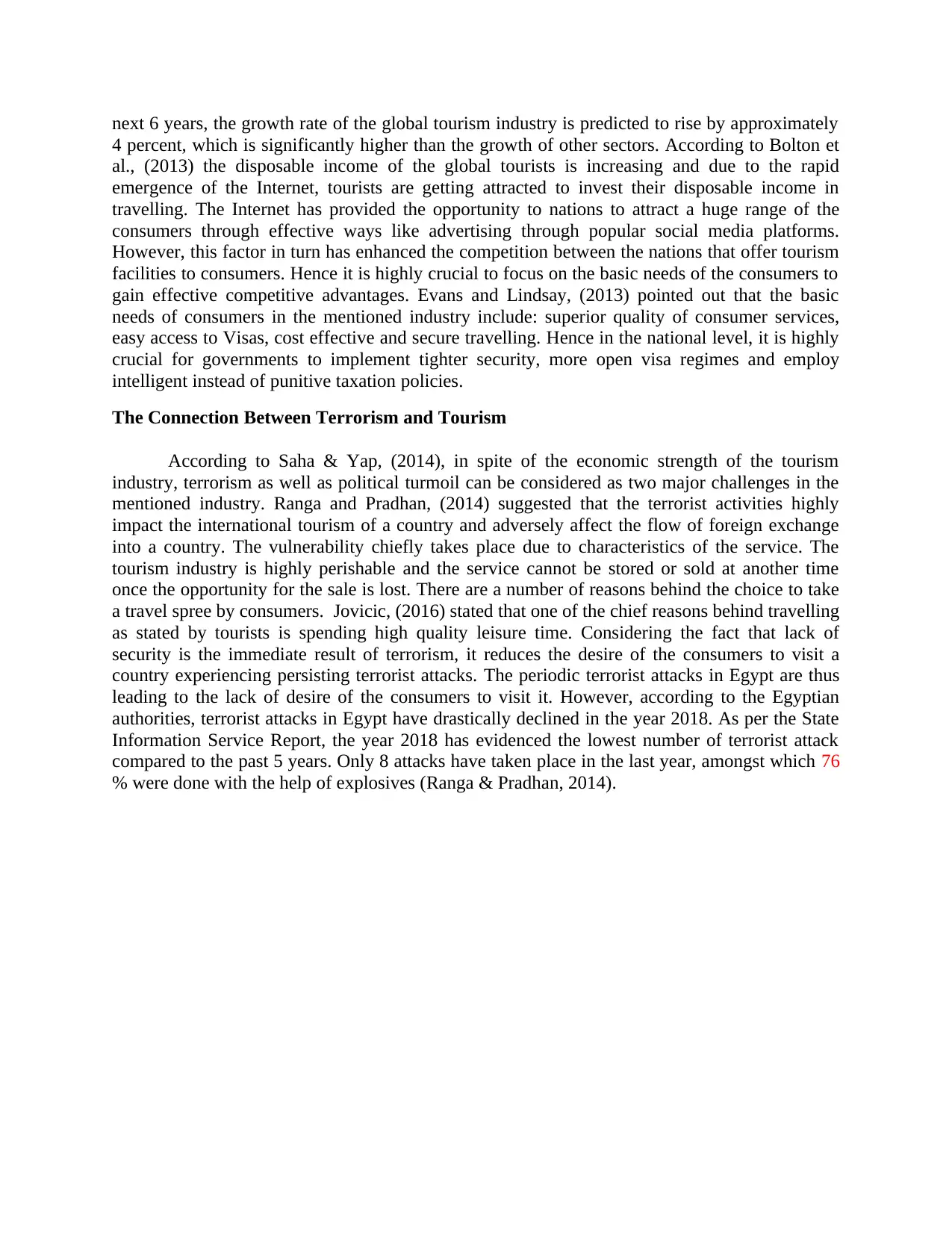
next 6 years, the growth rate of the global tourism industry is predicted to rise by approximately
4 percent, which is significantly higher than the growth of other sectors. According to Bolton et
al., (2013) the disposable income of the global tourists is increasing and due to the rapid
emergence of the Internet, tourists are getting attracted to invest their disposable income in
travelling. The Internet has provided the opportunity to nations to attract a huge range of the
consumers through effective ways like advertising through popular social media platforms.
However, this factor in turn has enhanced the competition between the nations that offer tourism
facilities to consumers. Hence it is highly crucial to focus on the basic needs of the consumers to
gain effective competitive advantages. Evans and Lindsay, (2013) pointed out that the basic
needs of consumers in the mentioned industry include: superior quality of consumer services,
easy access to Visas, cost effective and secure travelling. Hence in the national level, it is highly
crucial for governments to implement tighter security, more open visa regimes and employ
intelligent instead of punitive taxation policies.
The Connection Between Terrorism and Tourism
According to Saha & Yap, (2014), in spite of the economic strength of the tourism
industry, terrorism as well as political turmoil can be considered as two major challenges in the
mentioned industry. Ranga and Pradhan, (2014) suggested that the terrorist activities highly
impact the international tourism of a country and adversely affect the flow of foreign exchange
into a country. The vulnerability chiefly takes place due to characteristics of the service. The
tourism industry is highly perishable and the service cannot be stored or sold at another time
once the opportunity for the sale is lost. There are a number of reasons behind the choice to take
a travel spree by consumers. Jovicic, (2016) stated that one of the chief reasons behind travelling
as stated by tourists is spending high quality leisure time. Considering the fact that lack of
security is the immediate result of terrorism, it reduces the desire of the consumers to visit a
country experiencing persisting terrorist attacks. The periodic terrorist attacks in Egypt are thus
leading to the lack of desire of the consumers to visit it. However, according to the Egyptian
authorities, terrorist attacks in Egypt have drastically declined in the year 2018. As per the State
Information Service Report, the year 2018 has evidenced the lowest number of terrorist attack
compared to the past 5 years. Only 8 attacks have taken place in the last year, amongst which 76
% were done with the help of explosives (Ranga & Pradhan, 2014).
4 percent, which is significantly higher than the growth of other sectors. According to Bolton et
al., (2013) the disposable income of the global tourists is increasing and due to the rapid
emergence of the Internet, tourists are getting attracted to invest their disposable income in
travelling. The Internet has provided the opportunity to nations to attract a huge range of the
consumers through effective ways like advertising through popular social media platforms.
However, this factor in turn has enhanced the competition between the nations that offer tourism
facilities to consumers. Hence it is highly crucial to focus on the basic needs of the consumers to
gain effective competitive advantages. Evans and Lindsay, (2013) pointed out that the basic
needs of consumers in the mentioned industry include: superior quality of consumer services,
easy access to Visas, cost effective and secure travelling. Hence in the national level, it is highly
crucial for governments to implement tighter security, more open visa regimes and employ
intelligent instead of punitive taxation policies.
The Connection Between Terrorism and Tourism
According to Saha & Yap, (2014), in spite of the economic strength of the tourism
industry, terrorism as well as political turmoil can be considered as two major challenges in the
mentioned industry. Ranga and Pradhan, (2014) suggested that the terrorist activities highly
impact the international tourism of a country and adversely affect the flow of foreign exchange
into a country. The vulnerability chiefly takes place due to characteristics of the service. The
tourism industry is highly perishable and the service cannot be stored or sold at another time
once the opportunity for the sale is lost. There are a number of reasons behind the choice to take
a travel spree by consumers. Jovicic, (2016) stated that one of the chief reasons behind travelling
as stated by tourists is spending high quality leisure time. Considering the fact that lack of
security is the immediate result of terrorism, it reduces the desire of the consumers to visit a
country experiencing persisting terrorist attacks. The periodic terrorist attacks in Egypt are thus
leading to the lack of desire of the consumers to visit it. However, according to the Egyptian
authorities, terrorist attacks in Egypt have drastically declined in the year 2018. As per the State
Information Service Report, the year 2018 has evidenced the lowest number of terrorist attack
compared to the past 5 years. Only 8 attacks have taken place in the last year, amongst which 76
% were done with the help of explosives (Ranga & Pradhan, 2014).
⊘ This is a preview!⊘
Do you want full access?
Subscribe today to unlock all pages.

Trusted by 1+ million students worldwide
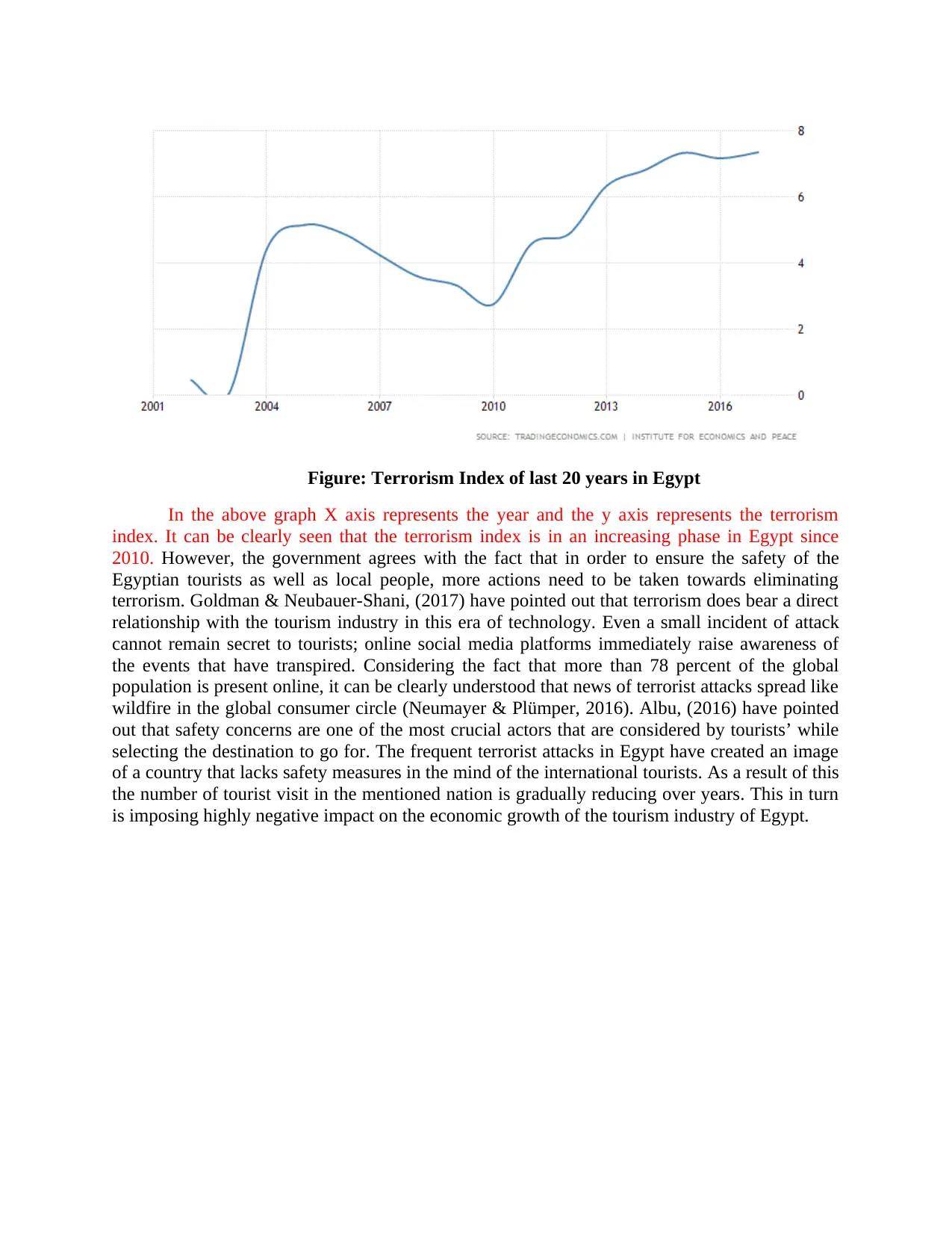
Figure: Terrorism Index of last 20 years in Egypt
In the above graph X axis represents the year and the y axis represents the terrorism
index. It can be clearly seen that the terrorism index is in an increasing phase in Egypt since
2010. However, the government agrees with the fact that in order to ensure the safety of the
Egyptian tourists as well as local people, more actions need to be taken towards eliminating
terrorism. Goldman & Neubauer-Shani, (2017) have pointed out that terrorism does bear a direct
relationship with the tourism industry in this era of technology. Even a small incident of attack
cannot remain secret to tourists; online social media platforms immediately raise awareness of
the events that have transpired. Considering the fact that more than 78 percent of the global
population is present online, it can be clearly understood that news of terrorist attacks spread like
wildfire in the global consumer circle (Neumayer & Plümper, 2016). Albu, (2016) have pointed
out that safety concerns are one of the most crucial actors that are considered by tourists’ while
selecting the destination to go for. The frequent terrorist attacks in Egypt have created an image
of a country that lacks safety measures in the mind of the international tourists. As a result of this
the number of tourist visit in the mentioned nation is gradually reducing over years. This in turn
is imposing highly negative impact on the economic growth of the tourism industry of Egypt.
In the above graph X axis represents the year and the y axis represents the terrorism
index. It can be clearly seen that the terrorism index is in an increasing phase in Egypt since
2010. However, the government agrees with the fact that in order to ensure the safety of the
Egyptian tourists as well as local people, more actions need to be taken towards eliminating
terrorism. Goldman & Neubauer-Shani, (2017) have pointed out that terrorism does bear a direct
relationship with the tourism industry in this era of technology. Even a small incident of attack
cannot remain secret to tourists; online social media platforms immediately raise awareness of
the events that have transpired. Considering the fact that more than 78 percent of the global
population is present online, it can be clearly understood that news of terrorist attacks spread like
wildfire in the global consumer circle (Neumayer & Plümper, 2016). Albu, (2016) have pointed
out that safety concerns are one of the most crucial actors that are considered by tourists’ while
selecting the destination to go for. The frequent terrorist attacks in Egypt have created an image
of a country that lacks safety measures in the mind of the international tourists. As a result of this
the number of tourist visit in the mentioned nation is gradually reducing over years. This in turn
is imposing highly negative impact on the economic growth of the tourism industry of Egypt.
Paraphrase This Document
Need a fresh take? Get an instant paraphrase of this document with our AI Paraphraser
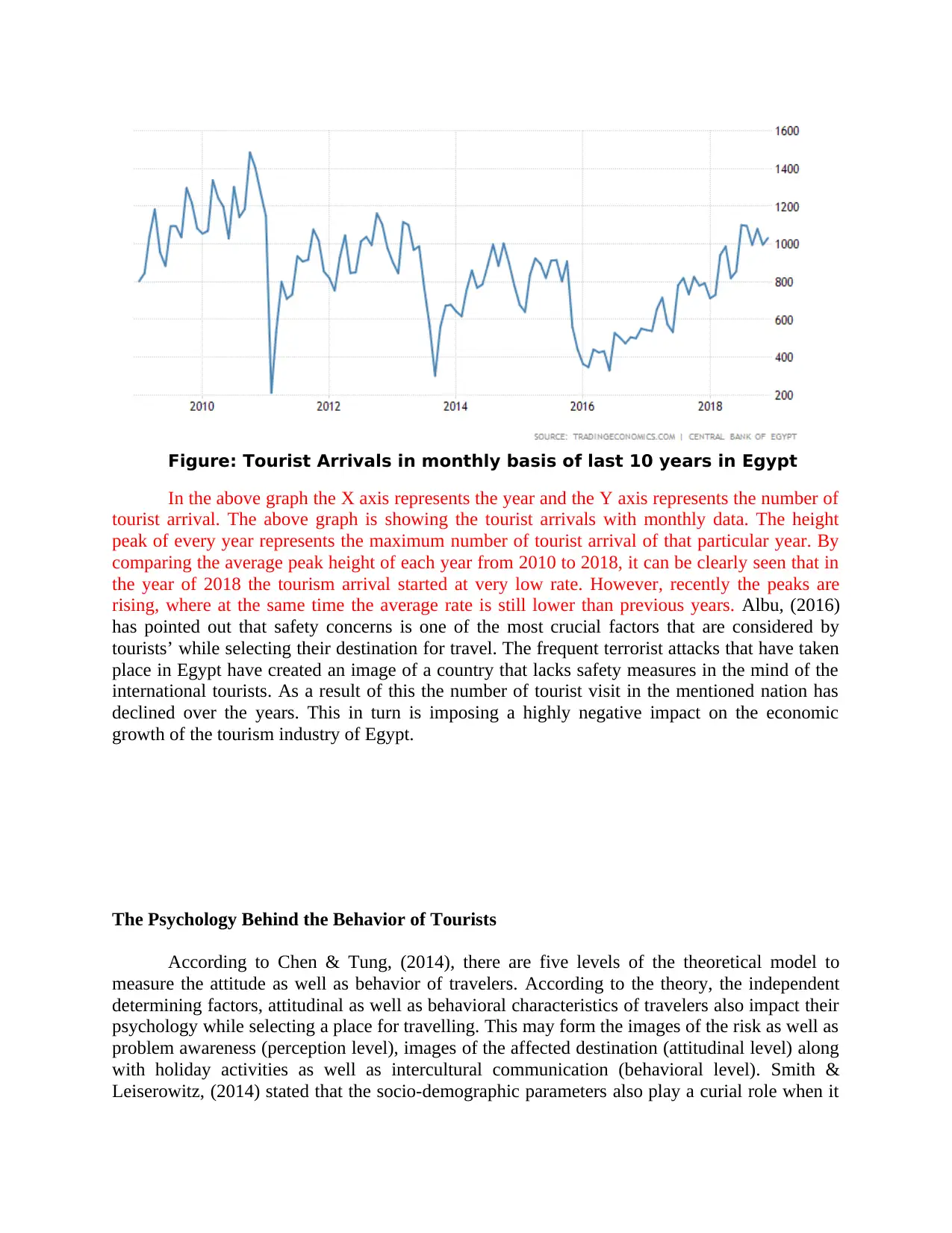
Figure: Tourist Arrivals in monthly basis of last 10 years in Egypt
In the above graph the X axis represents the year and the Y axis represents the number of
tourist arrival. The above graph is showing the tourist arrivals with monthly data. The height
peak of every year represents the maximum number of tourist arrival of that particular year. By
comparing the average peak height of each year from 2010 to 2018, it can be clearly seen that in
the year of 2018 the tourism arrival started at very low rate. However, recently the peaks are
rising, where at the same time the average rate is still lower than previous years. Albu, (2016)
has pointed out that safety concerns is one of the most crucial factors that are considered by
tourists’ while selecting their destination for travel. The frequent terrorist attacks that have taken
place in Egypt have created an image of a country that lacks safety measures in the mind of the
international tourists. As a result of this the number of tourist visit in the mentioned nation has
declined over the years. This in turn is imposing a highly negative impact on the economic
growth of the tourism industry of Egypt.
The Psychology Behind the Behavior of Tourists
According to Chen & Tung, (2014), there are five levels of the theoretical model to
measure the attitude as well as behavior of travelers. According to the theory, the independent
determining factors, attitudinal as well as behavioral characteristics of travelers also impact their
psychology while selecting a place for travelling. This may form the images of the risk as well as
problem awareness (perception level), images of the affected destination (attitudinal level) along
with holiday activities as well as intercultural communication (behavioral level). Smith &
Leiserowitz, (2014) stated that the socio-demographic parameters also play a curial role when it
In the above graph the X axis represents the year and the Y axis represents the number of
tourist arrival. The above graph is showing the tourist arrivals with monthly data. The height
peak of every year represents the maximum number of tourist arrival of that particular year. By
comparing the average peak height of each year from 2010 to 2018, it can be clearly seen that in
the year of 2018 the tourism arrival started at very low rate. However, recently the peaks are
rising, where at the same time the average rate is still lower than previous years. Albu, (2016)
has pointed out that safety concerns is one of the most crucial factors that are considered by
tourists’ while selecting their destination for travel. The frequent terrorist attacks that have taken
place in Egypt have created an image of a country that lacks safety measures in the mind of the
international tourists. As a result of this the number of tourist visit in the mentioned nation has
declined over the years. This in turn is imposing a highly negative impact on the economic
growth of the tourism industry of Egypt.
The Psychology Behind the Behavior of Tourists
According to Chen & Tung, (2014), there are five levels of the theoretical model to
measure the attitude as well as behavior of travelers. According to the theory, the independent
determining factors, attitudinal as well as behavioral characteristics of travelers also impact their
psychology while selecting a place for travelling. This may form the images of the risk as well as
problem awareness (perception level), images of the affected destination (attitudinal level) along
with holiday activities as well as intercultural communication (behavioral level). Smith &
Leiserowitz, (2014) stated that the socio-demographic parameters also play a curial role when it
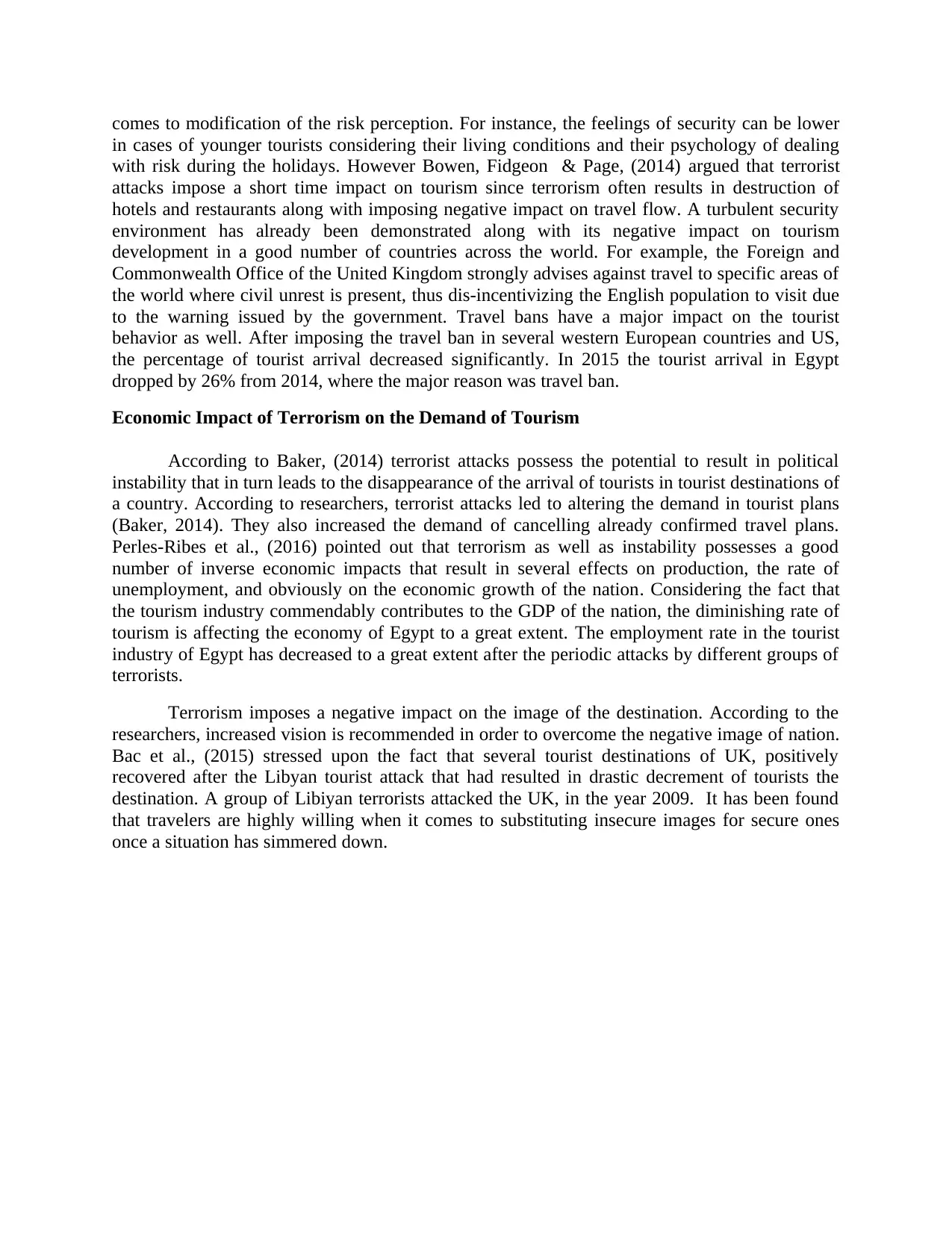
comes to modification of the risk perception. For instance, the feelings of security can be lower
in cases of younger tourists considering their living conditions and their psychology of dealing
with risk during the holidays. However Bowen, Fidgeon & Page, (2014) argued that terrorist
attacks impose a short time impact on tourism since terrorism often results in destruction of
hotels and restaurants along with imposing negative impact on travel flow. A turbulent security
environment has already been demonstrated along with its negative impact on tourism
development in a good number of countries across the world. For example, the Foreign and
Commonwealth Office of the United Kingdom strongly advises against travel to specific areas of
the world where civil unrest is present, thus dis-incentivizing the English population to visit due
to the warning issued by the government. Travel bans have a major impact on the tourist
behavior as well. After imposing the travel ban in several western European countries and US,
the percentage of tourist arrival decreased significantly. In 2015 the tourist arrival in Egypt
dropped by 26% from 2014, where the major reason was travel ban.
Economic Impact of Terrorism on the Demand of Tourism
According to Baker, (2014) terrorist attacks possess the potential to result in political
instability that in turn leads to the disappearance of the arrival of tourists in tourist destinations of
a country. According to researchers, terrorist attacks led to altering the demand in tourist plans
(Baker, 2014). They also increased the demand of cancelling already confirmed travel plans.
Perles-Ribes et al., (2016) pointed out that terrorism as well as instability possesses a good
number of inverse economic impacts that result in several effects on production, the rate of
unemployment, and obviously on the economic growth of the nation. Considering the fact that
the tourism industry commendably contributes to the GDP of the nation, the diminishing rate of
tourism is affecting the economy of Egypt to a great extent. The employment rate in the tourist
industry of Egypt has decreased to a great extent after the periodic attacks by different groups of
terrorists.
Terrorism imposes a negative impact on the image of the destination. According to the
researchers, increased vision is recommended in order to overcome the negative image of nation.
Bac et al., (2015) stressed upon the fact that several tourist destinations of UK, positively
recovered after the Libyan tourist attack that had resulted in drastic decrement of tourists the
destination. A group of Libiyan terrorists attacked the UK, in the year 2009. It has been found
that travelers are highly willing when it comes to substituting insecure images for secure ones
once a situation has simmered down.
in cases of younger tourists considering their living conditions and their psychology of dealing
with risk during the holidays. However Bowen, Fidgeon & Page, (2014) argued that terrorist
attacks impose a short time impact on tourism since terrorism often results in destruction of
hotels and restaurants along with imposing negative impact on travel flow. A turbulent security
environment has already been demonstrated along with its negative impact on tourism
development in a good number of countries across the world. For example, the Foreign and
Commonwealth Office of the United Kingdom strongly advises against travel to specific areas of
the world where civil unrest is present, thus dis-incentivizing the English population to visit due
to the warning issued by the government. Travel bans have a major impact on the tourist
behavior as well. After imposing the travel ban in several western European countries and US,
the percentage of tourist arrival decreased significantly. In 2015 the tourist arrival in Egypt
dropped by 26% from 2014, where the major reason was travel ban.
Economic Impact of Terrorism on the Demand of Tourism
According to Baker, (2014) terrorist attacks possess the potential to result in political
instability that in turn leads to the disappearance of the arrival of tourists in tourist destinations of
a country. According to researchers, terrorist attacks led to altering the demand in tourist plans
(Baker, 2014). They also increased the demand of cancelling already confirmed travel plans.
Perles-Ribes et al., (2016) pointed out that terrorism as well as instability possesses a good
number of inverse economic impacts that result in several effects on production, the rate of
unemployment, and obviously on the economic growth of the nation. Considering the fact that
the tourism industry commendably contributes to the GDP of the nation, the diminishing rate of
tourism is affecting the economy of Egypt to a great extent. The employment rate in the tourist
industry of Egypt has decreased to a great extent after the periodic attacks by different groups of
terrorists.
Terrorism imposes a negative impact on the image of the destination. According to the
researchers, increased vision is recommended in order to overcome the negative image of nation.
Bac et al., (2015) stressed upon the fact that several tourist destinations of UK, positively
recovered after the Libyan tourist attack that had resulted in drastic decrement of tourists the
destination. A group of Libiyan terrorists attacked the UK, in the year 2009. It has been found
that travelers are highly willing when it comes to substituting insecure images for secure ones
once a situation has simmered down.
⊘ This is a preview!⊘
Do you want full access?
Subscribe today to unlock all pages.

Trusted by 1+ million students worldwide
1 out of 27
Related Documents
Your All-in-One AI-Powered Toolkit for Academic Success.
+13062052269
info@desklib.com
Available 24*7 on WhatsApp / Email
![[object Object]](/_next/static/media/star-bottom.7253800d.svg)
Unlock your academic potential
Copyright © 2020–2026 A2Z Services. All Rights Reserved. Developed and managed by ZUCOL.




